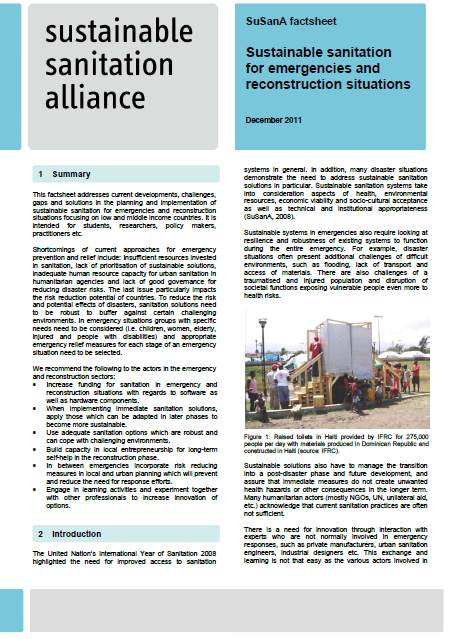Sustainable sanitation for emergencies and reconstruction situations - Factsheet of Working Group 8
Johannessen, A., Patinet, J., Carter, W., Lamb, J. (2012)

Published in: 2012
Publisher:
Sustainable Sanitation Alliance (SuSanA)
Author:
Johannessen, A., Patinet, J., Carter, W., Lamb, J.
Uploaded by:
SuSanA secretariat
Partner profile:
common upload
13367 Views
478 Downloads
Content - Summary
This factsheet addresses current developments, challenges, gaps and solutions in the planning and implementation of sustainable sanitation for emergencies and reconstruction situations focusing on low and middle income countries. It is mainly intended for students, researchers, policy makers and practitioners.
Shortcomings of current approaches for emergency prevention and relief include: Insufficient resources invested in sanitation, lack of prioritisation of sustainable solutions, inadequate human resource capacity for urban sanitation in humanitarian agencies and lack of good governance for reducing disaster risks. The last issue particularly impacts the risk reduction potential of countries. To reduce the risk
and potential effects of disasters, sanitation solutions need to be robust to buffer against certain challenging environments. In emergency situations, groups with specific needs need to be considered (i.e. children, women, elderly, injured and people with disabilities) and appropriate emergency relief measures for each stage of an emergency
situation need to be selected.
We recommend the following to the actors in the emergency and reconstruction sectors:
· Increase funding for sanitation in emergency and reconstruction situations with regards to software as well as hardware components.
· When implementing immediate sanitation solutions, apply those which can be adapted in later phases to become more permanent and sustainable.
· Use adequate sanitation options which are robust and can cope with challenging environments.
· Build capacity in local entrepreneurship for long-term self-help in the reconstruction phase.
· In between emergencies incorporate risk reducing measures in local and urban planning which will prevent and reduce the need for response efforts.
· Engage in learning activities and experiment together with other professionals to increase innovation of options.
Last updated: 30 April, 2012
Bibliographic information
Johannessen, A., Patinet, J., Carter, W., Lamb, J. (2012). Sustainable sanitation for emergencies and reconstruction situations - Factsheet of Working Group 8. Sustainable Sanitation Alliance (SuSanA)
Filter tags
Emergency and reconstruction situations (WG8) English Factsheets and policy briefs Publications by SuSanA Publications by SuSanA Urban informal settlements (slums)














